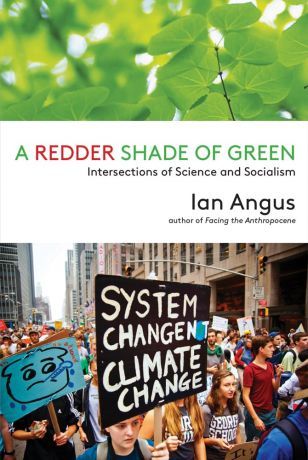Arts
You are here
Red all over

August 23, 2017
A Redder Shade of Green: Intersection of Science and Socialism
By Ian Angus
Review by Valerie Lannon
At 179 pages, this is a must-read book for everyone wanting a just society and a sustainable environment. Marxist Ian Angus is a prolific writer on science and socialism. He states “Red and green together are the colours of ecosocialism…there can be no true ecological revolution that is not socialist, and no true socialist revolution that is not ecological.” – hence the name of the book.
He is particularly interested in fostering an interest in earth science among socialists, an understanding he sees as necessary, though not sufficient, for preventing environmental crises. The book focuses on key debates among environmentalists, scientists and socialists who otherwise have in common grave concerns about the state of the planet. The book’s chapters are articles previously written for his web journal Climate and Capitalism, pulled together in one book for easier reference by activists.
Understanding science
The first and last of the five parts of the book are the reddest. He begins by reminding us of how seriously Marx and Engels paid attention to the leading natural scientists (like Darwin and the lesser known Schorlemmer and Liebig) and scientific discoveries of their day, whether in biology, chemistry or chemistry. With Trump scrapping the US Federal Advisory Committee for the Sustained National Climate Assessment, the call for us to be more like Marx and Engels is timely.
Part Two of the book takes up debates around the validity of the concept of the anthropocene, a geological term describing the current epoch, displacing the Holocene epoch of the previous 10,000 – 12,000 years, when life was most physically habitable for humans. Angus agrees with earth scientists who take on the notion that “humans have always interacted with nature so what’s so different about now?” Instead scientists argue that the factors that have made life habitable are now undergoing significant, different pressures (all of which are produced by humans) and the measurements of these factors show remarkable changes starting around 1950.
“The population bombers”
A chapter in Part Three takes on the “populationist” argument that continues to be raised no matter how many times it is disputed. According to the argument made prominent by Paul Ehrlich’s 1968 book The Population Bomb, population growth is the primary cause of environmental destruction, and the solution is population reduction. Espoused by some environmentalists, it is also a popular argument with racist and anti-immigrant groups. Those who espouse the argument see no alternative way of organizing production or distributing goods and services. But Angus states, "If the birth rate in Iraq or Afghanistan falls to zero, the U.S. military – the world’s worst polluter – will not use a gallon less oil. If every African country adopts a one-child policy, the drive to global climate catastrophe won’t slow down one bit."
He goes on to cite socialist environmentalist Barry Commoner, noting, “Commoner also said that trying to fix the environment by reducing population is like trying to repair a leaky ship by throwing passengers overboard. Instead we should ask if there isn’t something radically wrong with the ship.”
Red and Green together at last
After a fascinating couple of chapters on loss of biodiversity and ocean acidification, Angus moves on to the fifth part of the book, entitled Toward an Ecological Civilization.
Here he links the fight for socialism with the fight for climate justice. He cites specific steps that have been identified by many activists – to leave fossil fuels in the ground, stop agribusiness, stop super-extraction (of forests and oceans), increase public transport, stop warfare, etc.
Conclusion and further reading
One could quibble with Angus’ softness on Cuba or his seeming unwillingness to acknowledge the good work being done by socialists in building the environmental movements. But the strengths of this book far, far outweigh its weaknesses and should be read by all. Its brief chapters lend the book well to use by a reading or study group.
Other strongly recommended books by Angus include Facing the Anthropocene: Fossil capitalism and the crisis of the earth system and (co-authored with Simon Butler) Too Many People? Population, Immigration, and the Environmental Crisis, in which they de-bunk arguments about population size as the major contributor to the climate crisis.
Socialist Worker will be reviewing other books on climate justice written from a Marxist perspective; stay tuned.
Section:









